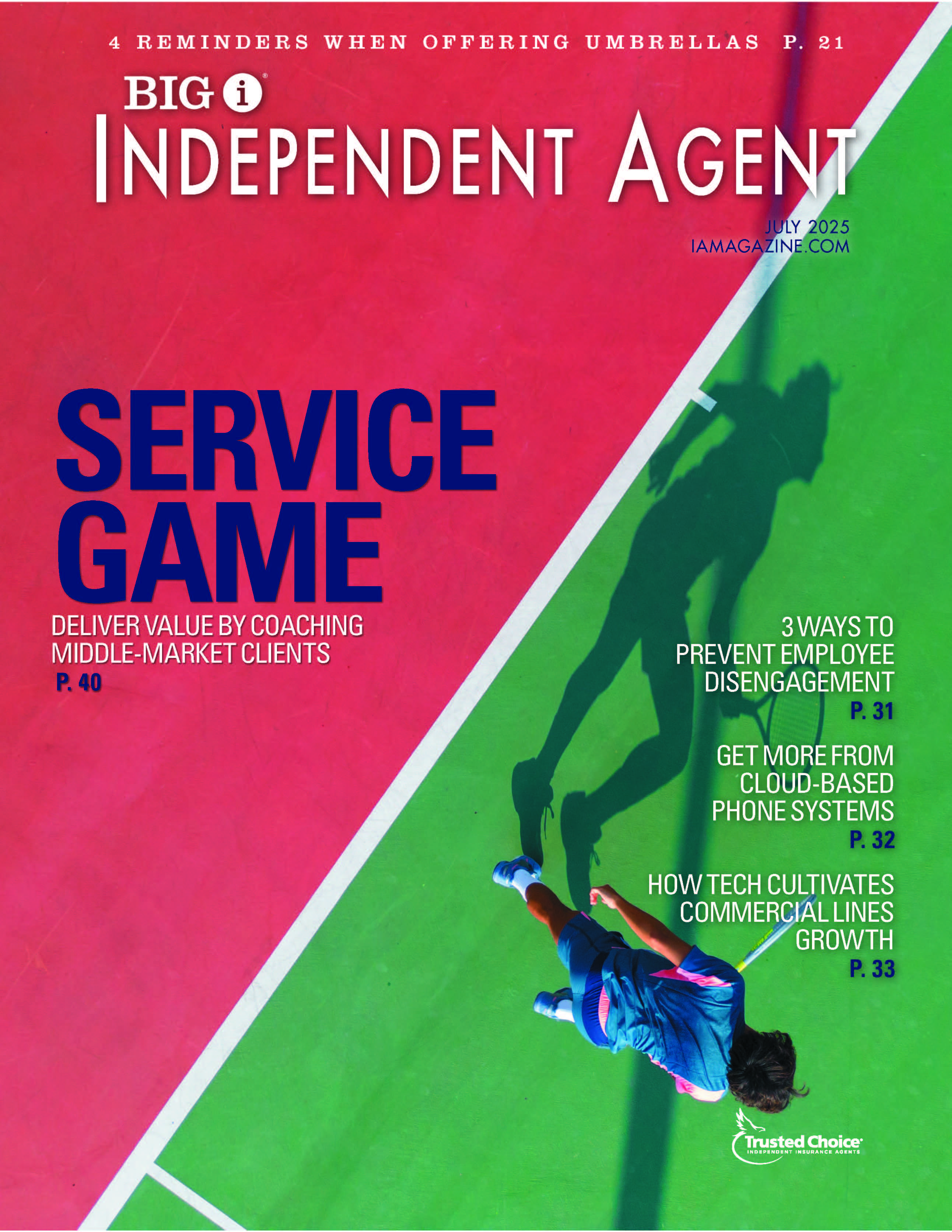Checking Out: Is There an Optimal Age to Sell Your Insurance Agency?

By: Jeff Smith
Whether you are planning to perpetuate internally or sell externally, it is inevitable that you are going to sell your ownership stake at some point. Every ownership situation is unique. But based on the average $600,000 annual revenue agency, after reviewing the financial projections of what happens to the growth, profitability and value of an agency as an agency owner ages, 58 is the optimal age to sell an insurance agency.
Here are four reasons for selling at this age:
1) Benefits of ownership. It gives you enough time to enjoy the benefits of owner distributions. At the age of 58, you will likely have had 12-15 years of owning the agency and thereby reaping the rewards of distributions.
2) Peak value of the agency. Agencies with owners in their 50s tend to still be growing, so the agency value is still increasing. Once agency owners enter their 60s and 70s, growth and profitability decline, which decreases agency value.
3) Energy to achieve the earnout. Most sales come with the incentive of a three-year growth earnout that can be worth as much as 25%-33% of the entire transaction. By selling at 58 instead of 65, you will likely have more energy and focus to put in the work to hit your earnout and maximize your return.
4) Quality of life and continued earnings. By selling at 58, you are likely still healthy, so you can continue to work with less stress and focus on enjoying your life. Your work allows you to help transition the agency, stay engaged professionally, continue to earn money and fulfill a lifetime passion for serving clients.
Based on data acquired by IA Valuations, here are a handful of charts that illustrate why selling your agency at 58 years old is the best option.
 Benefits of Ownership
Benefits of Ownership
The benefit of ownership is the most variable factor in the equation. Owners love the distributions associated with ownership. It is the culmination of their hard work bearing fruit.
Distributions largely depend on the growth and profitability of the agency. The profitability of the agency declines significantly when an owner is in their 70s. As to how long the agency owner should hold onto ownership while maximizing distributions, continuing to invest in the agency and preserving peak value is a question of risk and reward.
In a sale, the buyer is giving the seller an advance for the future forecasted profits of the agency for a lump sum, thereby transferring risk and reward from the current owner. If the owner feels confident that they can continue to make the necessary investments to grow while remaining profitable, holding for an additional one to three years of distributions likely makes good business sense.
While an owner can continue to enjoy profitability in their 50s and 60s, we believe the age of 58 allows the owner to have received significant distributions of ownership over 12 to 15 years. The tradeoff for the benefit of ownership is the additional stress that comes with ownership and the risk of continuing those profits.
 Peak Value of the Agency
Peak Value of the Agency
All buyers want to purchase an appreciating asset, not a declining one. The value of most agencies peaks when the owners are in their 50s and then begins to decline when the owners are in their 60s and 70s. Why is this? In large part, because the growth and profitability of the agency begin to decline as the owner’s age advances into their 60s and 70s.
So, this raises the question: Can you hang on to ownership for too long? The answer depends on your agency’s current and future performance and your own personal financial situation and goals. Ultimately, an owner can overstay their welcome.
Typically, the value of an agency grows along with the revenue until the agency owner reaches 58 years old. At that point, the agency revenue begins to slow down, as does its growth. When growth becomes stagnant and declines, the value of the asset begins to decline as a result.
In a hypothetical sale of an agency, an agency owner who sells at 58 and invests the purchase price money at a 5% return would wind up with almost double the money at 70 than an owner who sells at 65.
 Energy to Achieve the Earnout
Energy to Achieve the Earnout
Many agency sales include an earnout over a three-year period if they meet certain organic growth measures. These opportunities can be worth as much as 25%-33% of the overall deal value.
As you see in the graph, agency growth slows down significantly as owners enter their 50s, 60s and 70s.
Typically, hunger and the need for growth dissipate as we age and the business transitions to more of a lifestyle operation. The agency owner’s interest and focus changes from a sales culture focused on growth to a service culture focused on protecting and retaining the current book of business. At this stage, many agency owners slow down client acquisition to build higher fences around the current clients.
Therefore, at 58, there is a greater likelihood that you may still have the energy to grind and help the agency grow and achieve the additional earnout. The earnout can require anywhere from an annual 5%-10% growth rate and compounded growth rate of 30% over three years. While pre-2021, that type of growth was reserved for those agencies which qualified as Best Practices agencies in the Best Practices Study from the Big “I” and Reagan Consulting, in this rate environment, it may be attainable for a wider range.
If you are trying to achieve a Best Practices level earnout at 65 or 68, it is going to be increasingly difficult to produce the type of organic growth needed to maximize your earnout opportunity.
 Continued Earnings and Quality of Life
Continued Earnings and Quality of Life
At 58, the owner still has an extended period during which they can work and produce business. By selling, they can work at a more comfortable pace without the stress of managing day-to-day operations and the pressure of growing a business. They can focus on the activities that typically provide them the greatest joy: taking care of their clients, solving complex risk problems and engaging in their local community.
In today’s tight labor market, experienced insurance professionals are a coveted resource for insurance agencies. Most buyers put a premium on the retention of the owner and staff for an extended period. While the owner’s annual income will likely drop immediately after the sale, a well-negotiated deal will ensure the owner is compensated at a level commensurate with their experience and value to the agency.
The average life expectancy for an American is 76 years old, according to the U.S. Centers for Disease Control and Prevention, and by selling the majority of your ownership at 58, you get close to 20 years to enjoy the fruits of your labor. At 58, we are mostly still healthy, mobile and enjoy a high quality of life. Depending on your family situation, at this age your children could be beginning to have children of their own. Less stress and responsibility at the office frees you up to enjoy the second cycle of life’s greatest joys: grandchildren.
In addition, it gives you plenty of time and mobility to travel and see the world. All of those items on your bucket list can become a reality. Your dream of sunshine in the winter becomes more real if you have transitioned the responsibility and stress of managing a business.
Whether you are 48, 58 or 68, planning for the transition of your agency takes time and needs to be given the same diligence you have given to building your business.
Jeff Smith, JD, CIC, CAE, is CEO of the Ohio Insurance Agents Association.
Copyright ©2023 by IA Valuations and Ohio Insurance Agents Association (OIA). All rights reserved. No portion of this document may be reproduced in any manner without the prior written consent of IA Valuations or OIA. In addition, this document may not be posted as a link on any public or private website without the prior written consent of IA Valuations or OIA.










